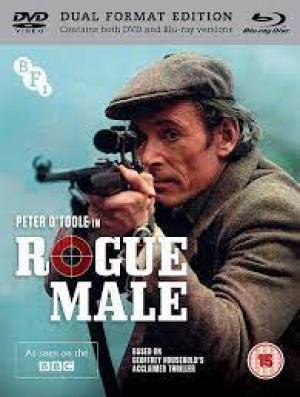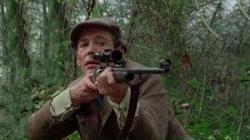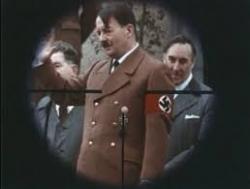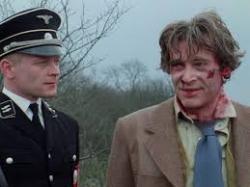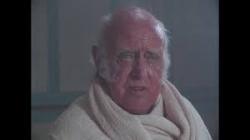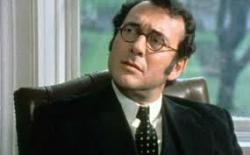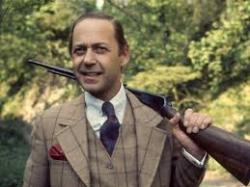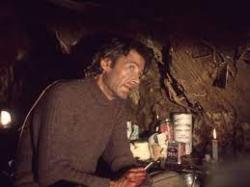Gentleman stalker
By Michael J. Roberts
"Many years ago I sent an old, beloved jacket to a cleaner, the Sycamore Cleaners. It was a leather jacket covered in Guinness and blood and marmalade, one of those jobs... and it came back with a little note pinned to it, and on the note it said, 'It distresses us to return work which is not perfect.' So that will do for me. That can go on my tombstone." ~ Peter O'Toole
Geoffrey Household’s 1939 novel Rogue Male had been filmed before in 1941 as Man Hunt by Fritz Lang when Clive Donner came to tackle it in 1976. Donner enjoyed a faithful adaptation by Frederic Raphael, as opposed to Lang’s heavily changed earlier version by Dudley Nichols, but both shared the same first act, an upper-class Brit stalking an unnamed fascist dictator who is obviously assumed to be Adolph Hitler. Peter O'Toole led a fine cast in a brilliant evocation of the tension in Europe on the eve of the unthinkable, another World War, and of one man's notion to short circuit the entire prospect.
In mid 1939, Sir Robert Hunter (Peter O’Toole) is an English aristocrat who decides to see if it is possible to take a ‘pot shot’ at Adolph Hitler. He stalks the German leader to a remote mountain retreat and sets himself up in range and soon has the dictator in his sights. He is captured and tortured and left for dead but manages to crawl away and find help to enables his return to England. As he tries to elicit help from his relative The Earl (Alistair Sim) he fends off attacks from the Nazi agents but as he’s created an international incident there’s nothing The Earl can do, and Hunter goes to ground. He soon finds that Major Quive-Smith (John Standing), another English gentleman whose sympathies lie with the Germans, has deduced what a sportsman like Hunter would do and is on his tail.
At time Household wrote the novel it was not ‘proper’ to write a fiction involving the assassination of a head of state, Nazi or no, and his novel was deliberately left open as to the target, Household commenting, ‘Although the idea for Rogue Male germinated from my intense dislike of Hitler, I did not actually name him in the book as things were a bit tricky at the time and I thought I would leave it open so that the target could be either Hitler or Stalin. You could take your pick’. The protagonist is a well-connected upper-class type, which contrasts with the reality that many of the aristocracy and landed gentry were in sympathy with Hitler’s Germany during that time, as is exemplified in the character of Quive-Smith. Britain had recently come out of the Great Depression and an unemployment rate of 22% and had suffered under the spectre of war for several years, desperate to avoid another conflict like WWI. This led to the appeasement of Hitler over the Sudetenland and the Munich Agreement which Neville Chamberlain heralded as ‘peace in our time.’ Support for British fascist Oswald Mosley’s party (British Union of Fascists) peaked at some 50,000 members during the decade and fear of communism on the right of politics was adding to the notional support of Hitler’s aims amongst conservatives.
Clive Donner directed the prime time BBC TV film, but achieved a smooth narrative flow without any fussy or flashy cinematography and kept the tension high and the interest keen in the thrill of the hunt. The equally unfussy and tight script was from Frederic Raphael, a prolific novelist who regularly dipped his finger in the inkwell of screenplays. Raphael had worked successfully with Donner over a decade before with the wonderful and biting black satire, Nothing But The Best, starring Alan Bates. He went on to write a couple of fine films for John Schlesinger in Darling, which won him the Academy Award for Best Screenplay and Far From The Madding Crowd, both star vehicles for the luminous Julie Christie.
The film works as well as it does because Peter O’Toole is a once in a generation talent. Here he is approaching middle age but delivers a pitch perfect portrait of a conflicted gentleman who is driven to an extreme choice, but one that he approaches with the equanimity and calmness of peeling an egg. Hunter is rarely given to outbursts of emotion as he is a privileged man in control of his environment and when things go pear shaped he maintains his Keep Calm and Drink Tea composure. O’Toole inhabits the skin of the sportsman who obviously can’t bring himself to admit he is something as ghastly as an assassin, so he frames it in his own mind as a ‘sporting stalk’ and the tension is in the gap between those two points – will he pull the trigger and become the monster in order to kill the monster? It’s a high wire act that O’Toole pulls off with consummate skill, negotiating pithy exchanges with Nazi’s, sympathetic Germans, bemused sailors, his eccentric Earl and with Quive-Smith most of all.
"My own favourite is something called Rogue Male." ~ Peter O'Toole
Clive Donner had also worked with Peter O’Toole during the directors most successful period in the 1960s, with the Woody Allen scripted sex-farce, What’s New Pussycat?. Donner had directed the superb The Caretaker and the equally fine Nothing But The Best as a couple of pivotal entries in the British New Wave and was poised for bigger things, but as fate would have it they never took off for him as they did for Tony Richardson or John Shlesinger. What’s New Pussycat? did good business, but Donner followed it with two commercial flops and from the 1970s he concentrated (with a few unremarkable exceptions) on Made-For-TV films, and Rogue Male is easily the most distinguished of that cohort.
The film is a rollicking tale of an unlikely convergence of class and decency fighting pure evil in a tilting at windmills equation as Hunter’s Quixote battles the incoming storm with his wits and wiles and not much else. John Standing is his usual reliable foil and delivers an effortless portrayal of the banality of evil - a man devoted to a putrid cause that he deludes himself is not only worthy of him, but worthy of Hunter’s allegiance. The scenes where he proselytises on behalf of the Fuhrer to the cornered and bemused hunter are amongst the most memorable exchanges in the witty and thoughtful script. Rogue Male is a triumph of straightforward, no fuss, relatively low-budget storytelling done by a team of top professionals at every level, ably helmed by a director who had a command of the medium that few others enjoyed.
